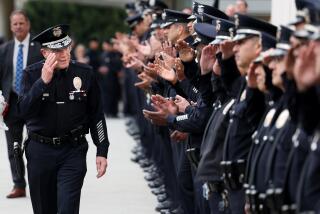Column: LAPD officer’s assault conviction falls short in addressing police issues
The guilty verdict may provide a measure of comfort for Alesia Thomas’ family.
A Los Angeles Police Department officer was convicted Friday of assault in a 2012 arrest, when she shoved and kicked Thomas, who was struggling to breathe in the back seat of a patrol car. Thomas, in handcuffs and leg restraints, was dead by the time an ambulance got her to a hospital.
The officer, Mary O’Callaghan, was hauled off to jail right after the jury verdict.
Her conviction is being hailed as a victory in a justice system that too often fails to protect victims of police brutality.
But it doesn’t address another issue that we can’t afford to keep ignoring: Thomas was not a dangerous criminal suspect, just a desperate struggling mother. Did she belong in that patrol car?
She was being arrested for dropping off her two children, ages 3 and 12, at an LAPD station in the middle of the night. They had a bag of clothes and a note asking police to call their grandmother. Officers were dispatched to Thomas’ South Los Angeles apartment, where she reportedly told them she was addicted to drugs and not up to dealing with kids.
What she’d done was considered child endangerment, and police were determined to take her into custody. Thomas was just as determined to be left alone. She resisted, and O’Callaghan responded with threats and brute force.
Thomas’ death is not being blamed on police; an autopsy attributed it, in part, to cocaine intoxication. The incident didn’t even make news until months after she died, when patrol-car videos of O’Callaghan’s kick led to a criminal charge of assault under color of authority.
I wrote about the incident back then, questioning the decision to arrest a troubled woman for a choice that may have made sense to her and kept her children out of danger.
LAPD Commander Michel Moore considered the question in starkly different terms: “It’s not our responsibility to turn a blind eye and say, ‘Well, she’s got a drug problem and she’s just a victim’ or whatever,” he told me then.
“We’re the agency of last resort. At 2 in the morning, there’s no one else for us to turn to and say, ‘Hey, can you handle this for us.’’’
::
Moore is right about that much. Police are forced to respond to social issues — homelessness, mental illness, alcoholism and drug abuse — because we have failed to address them.
None of that excuses O’Callaghan’s cruel and criminal acts. But while she’s doing time, we ought to take a look at the forces that conspire to harden officers’ hearts.
I went to court prepared to despise O’Callaghan. The video provides plenty of ammunition.
It records her ugly insults. It shows her jabbing her boot into Thomas’ stomach and crotch. A few minutes later, Thomas is unconscious. O’Callaghan peeks into the patrol car, takes a drag from her cigarette and casually remarks: “I don’t think she’s breathing.”
In his final argument, the prosecutor made sure the jury took note: “This is a police officer that is so cynical about the people she polices, she dehumanizes them,” Assistant Head Deputy Dist. Atty. Shannon Presby said.
But outside the courthouse, after O’Callaghan was taken away in handcuffs, her lawyer Robert Rico tried to paint a different picture:
O’Callaghan spent 13 years in the Marines “defending our country” and 18 years at the LAPD protecting our streets, he said. She’s the type of officer who buys Halloween costumes for kids in the projects and hands out Christmas gifts.
Her comments and behavior the night Thomas died were an “aberration,” he said; one bad night in an otherwise exemplary life.
O’Callaghan regrets that the last words Thomas heard were the insults she delivered, Rico said. “As a mother and a daughter, that’s been weighing on her heavily.”
::
Thomas was a mother and daughter too. And if she had lived, her decision to dump her kids on the cops might be weighing on her heavily.
What happened that night was an aberration for her, said her mother, Sondra Thomas.
“She didn’t come to them to throw her kids away,” her mother told me back then. Alesia Thomas had been depressed for years, since her father died in 2006. She’d become frustrated by her 12-year-old son’s obsession with video games. She’d tried to reach her mother, whose cellphone was turned off.
“The kids were getting on her nerves. She was just tired, real tired,” Sondra Thomas said.
There’s a heart-wrenching sort of irony to her daughter’s death in the custody of police.
Alesia Thomas believed — and taught her children — that the police station was a place where they would be safe.
Her mother still can’t understand how things went so wrong:
“When the kids came walking in there, with their little satchel and [my] phone number, you expect the police to say: ‘What do we have here? Let’s get a man and a woman officer to go over and ask your mom what’s going on. What issues are you suffering from.’
“To sit down and have a little talk and find out what’s going on. To approach her decently.”
That would be the real meaning of community policing.
It’s treating residents, no matter how broken or belligerent they are, not like problems but like people you actually care about.
Twitter: @SandyBanksLAT
More to Read
Sign up for Essential California
The most important California stories and recommendations in your inbox every morning.
You may occasionally receive promotional content from the Los Angeles Times.











